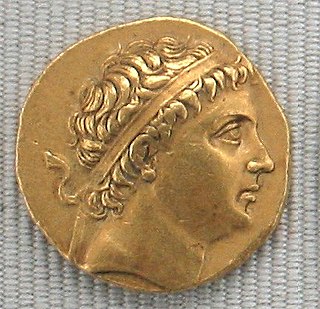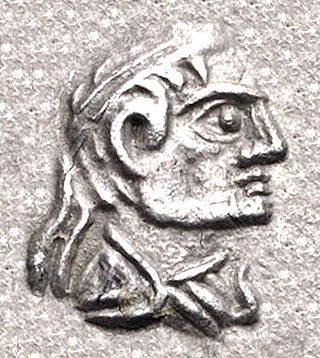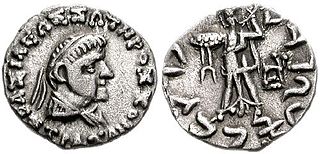
The Ptolemaic dynasty, also known as the Lagid dynasty, was a Macedonian Greek royal house which ruled the Ptolemaic Kingdom in Ancient Egypt during the Hellenistic period. Reigning for 275 years, the Ptolemaic was the longest and last dynasty of ancient Egypt from 305 BC until its incorporation into the Roman Republic in 30 BC.

Demetrius ISoter reigned as king of the Hellenistic Seleucid Empire from November 162 to June 150 BC. Demetrius grew up in Rome as a hostage, but returned to Greek Syria and overthrew his young cousin Antiochus V Eupator and regent Lysias. Demetrius took control during a turbulent time of the Empire, and spent much of his time fighting off revolts and challenges to his power from threats such as Timarchus and Alexander Balas.

Demetrius III Theos Philopator Soter Philometor Euergetes Callinicus was a Hellenistic Seleucid monarch who reigned as the King of Syria between 96 and 87 BC. He was a son of Antiochus VIII and, most likely, his Egyptian wife Tryphaena. Demetrius III's early life was spent in a period of civil war between his father and his uncle Antiochus IX, which ended with the assassination of Antiochus VIII in 96 BC. After the death of their father, Demetrius III took control of Damascus while his brother Seleucus VI prepared for war against Antiochus IX, who occupied the Syrian capital Antioch.

Antiochus I Soter was a Greek king of the Seleucid Empire. Antiochus succeeded his father Seleucus I Nicator in 281 BC and reigned during a period of instability which he mostly overcame until his death on 2 June 261 BC. He is the last known ruler to be attributed the ancient Mesopotamian title King of the Universe.

Diodotus I Soter was the first Hellenistic king of Bactria. Diodotus was initially satrap of Bactria, but became independent of the Seleucid empire around 255 BC, establishing the Greco-Bactrian Kingdom. In about 250 BC, Diodotus repelled a Parthian invasion of Bactria by Arsaces. He minted an extensive coinage and administered a powerful and prosperous new kingdom. He died around 235 BC and was succeeded by his son Diodotus II.

The Hasmonean dynasty was a ruling dynasty of Judea and surrounding regions during the Hellenistic times of the Second Temple period, from c. 140 BCE to 37 BCE. Between c. 140 and c. 116 BCE the dynasty ruled Judea semi-autonomously in the Seleucid Empire, and from roughly 110 BCE, with the empire disintegrating, Judea gained further autonomy and expanded into the neighboring regions of Perea, Samaria, Idumea, Galilee, and Iturea. The Hasmonean rulers took the Greek title basileus ("king") as the kingdom became a regional power for several decades. Forces of the Roman Republic intervened in the Hasmonean Civil War in 63 BCE and made it into a client state, marking the decline of Hasmonean dynasty; Herod the Great displaced the last reigning Hasmonean client-ruler in 37 BCE.
Epiphanes, meaning "Manifest" or "the Glorious/Illustrious", is an ancient Greek epithet borne by several Hellenistic rulers. It produced the Russian-language given name Yepifan/Epifan.

Strato I Dikaios also known as Stratha in Sanskrit, was a Yavana King, the son and successor of Menander, Strato’s mother, Agathoclea ruled as Queen Mother and regnant for Strato until 120 BCE, when he was of age to succeed his father. He was dynastically succeeded by his son, Menander II.

Zoilus II Soter was an Indo-Greek king who ruled in eastern Punjab. Bopearachchi dates his reign to c. 55–35 BC, a date approximately supported by R. C. Senior. It is possible that some of his coins were issued by a separate king, Zoilus III.

Dionysius Soter was an Indo-Greek king in the area of eastern Punjab.

Apollophanes Soter was an Indo-Greek king in the area of eastern and central Punjab in modern India and Pakistan.

Epander was one of the Indo-Greek kings. He may have been a relative of Menander I, and the findplaces of his coins seem to indicate that he ruled in the area of Punjab.

Diomedes Soter was an Indo-Greek king and possible claimant Greco-Bactrian King who may have attempted to reconquer the lands north of the Hindu Kush. The places where his coins have been found seem to indicate that his rule was based in the area of the Paropamisadae, possibly with temporary dominions further east. Judging from their similar portraits and many overlapping monograms, the young Diomedes seems to have been the heir of Philoxenus, the last king to rule before the kingdom of Menander I finally fragmented.

Strato IISoter also known as Stratha, was an Indo-Greek king. He ruled c. 25 BCE to 10 CE according to Bopearachchi. R. C. Senior suggests that his reign ended perhaps a decade earlier. He may have been supplanted by the Indo-Scythian Northern Satraps, particularly Rajuvula and Bhadayasa, whose coins were often copied on those of the last Indo-Greek kings. Numerous coins of Rajuvula have been found in company with the coins of the Strato group in the Eastern Punjab and also in the Mathura area: for example, 96 coins of Strato II were found in Mathura in conjunction with coins of Rajuvula, who also imitated the designs of Strato II in the majority of his issues.

Polyxenus Epiphanes Soter was an Indo-Greek king who ruled briefly in western Punjab or Gandhara.

Jonathan Apphus was one of the sons of Mattathias and the leader of the Hasmonean dynasty of Judea from 161 to 143 BCE.

The Ptolemaic Kingdom or Ptolemaic Empire was an Ancient Greek polity based in Egypt during the Hellenistic period. It was founded in 305 BC by the Macedonian general Ptolemy I Soter, a companion of Alexander the Great, and ruled by the Ptolemaic dynasty until the death of Cleopatra VII in 30 BC. Reigning for nearly three centuries, the Ptolemies were the longest and final dynasty of ancient Egypt, heralding a distinctly new era for religious and cultural syncretism between Greek and Egyptian culture.
Euergetes, meaning "the Benefactor", was an epithet, an honoring title, given to various benefactors. Euergetism was the practice of high-status and wealthy individuals distributing part of their wealth to the community. For example,
Philopator, meaning "father-loving", was a common royal epithet among Hellenistic monarchs:
Philometor, meaning "mother-loving", was a common royal epithet among Hellenistic monarchs:















